Martin Johnes
Voices of Cymru
Brittle with Relics: A History of Wales, 1962–97
By Richard King
(Faber & Faber 526pp £25)
One of the United Kingdom’s defining features is that it consists of four different nations. Yet during the pandemic, parts of the London media have seemed surprised and even outraged that the other three nations have chosen different policies from England. Such perspectives are connected to how Wales has often been marginalised in discussions of British life, politics and history. In Wales itself, this marginalisation has had profound economic and cultural consequences. Brittle with Relics is a history of Wales’s sidelining and the fight against it.
Richard King, best known as a writer about music, is not a conventional historian, and this is not a conventional history. It consists of extracts from interviews with nearly a hundred politicians, activists, musicians and others. Most are not well known in or outside Wales but there are some, such as Neil Kinnock, Michael Sheen and the Manic Street Preachers, who will be familiar to wider audiences. Combining them with extracts from published sources, King has woven these interviews into thematic chapters to produce a compelling narrative. King says he has chosen this approach to ensure that people are ‘heard on their own terms and by their own authority’. He also believes that it ‘favours the grain of the voice and the grain of the Welsh voice in particular’. That feels somewhat clichéd, but the interviewees are eloquent and articulate and the book as a whole makes for a powerful and engaging read.
Its chronology runs from Saunders Lewis’s seminal radio broadcast of 1962 on the future of Welsh to the devolution referendum of 1997. In the intervening three and a half decades, Wales underwent profound change, both as a society and as a nation. The book explores some crucial events in

Sign Up to our newsletter
Receive free articles, highlights from the archive, news, details of prizes, and much more.@Lit_Review
Follow Literary Review on Twitter
Twitter Feed
‘The Second World War was won in Oxford. Discuss.’
@RankinNick gives the question his best shot.
Nicholas Rankin - We Shall Fight in the Buttery
Nicholas Rankin: We Shall Fight in the Buttery - Oxford’s War 1939–1945 by Ashley Jackson
literaryreview.co.uk
For the first time, all of Sylvia Plath’s surviving prose, a massive body of stories, articles, reviews and letters, has been gathered together in a single volume.
@FionaRSampson sifts it for evidence of how the young Sylvia became Sylvia Plath.
Fiona Sampson - Changed in a Minute
Fiona Sampson: Changed in a Minute - The Collected Prose of Sylvia Plath by Peter K Steinberg (ed)
literaryreview.co.uk
The ruling class has lost its sprezzatura.
On porky rolodexes and the persistence of elite reproduction, for the @Lit_Review: